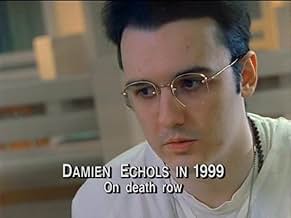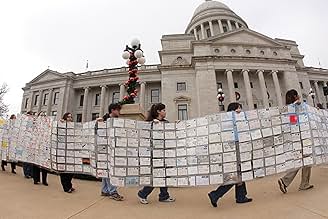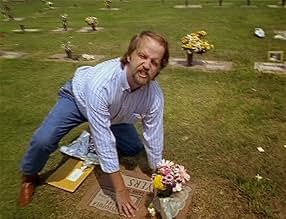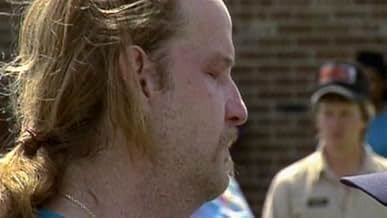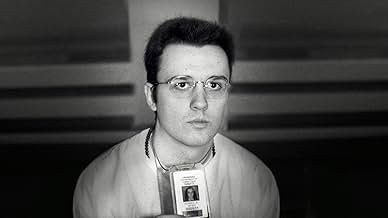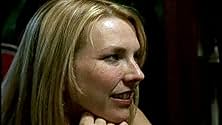IMDb रेटिंग
7.5/10
10 हज़ार
आपकी रेटिंग
अपनी भाषा में प्लॉट जोड़ेंThe case of the West Memphis Three, its questionable circumstances and the parties involved are followed up years later.The case of the West Memphis Three, its questionable circumstances and the parties involved are followed up years later.The case of the West Memphis Three, its questionable circumstances and the parties involved are followed up years later.
- 1 प्राइमटाइम एमी के लिए नामांकित
- 2 जीत और कुल 1 नामांकन
Melissa Byers
- Self
- (आर्काइव फ़ूटेज)
Tim Sullivan
- Self
- (आर्काइव ध्वनि)
Jessie Misskelley
- Self
- (as Jessie Miskelly)
फ़ीचर्ड समीक्षाएं
But not for the right reasons.
The snickering, smug arrogance of the filmmakers, who seem to have more screen time than anyone actually involved in the case, made me see this documentary as just a vanity project. I couldnt even buy the patronizing solicitude they showed towards one defendant (undoubtedly because he is the most photogenic of the three convicted of the crime).
There is a definite travesty of justice here, but getting to the truth seems to have become secondary to the childish delight with which the filmmakers show how much smarter they are than anyone else.
Their hearts may indeed be in the right place, and they truly want to see justice served, but this kind of flagrant self-aggrandizment does not do justice to anyone.
The film offers no real evidence as to the identity of the "real" killer, beyond the filmmakers' own speculation and innuendo - which is precisely what convicted the three boys they are trying to "save" in the first place.
The snickering, smug arrogance of the filmmakers, who seem to have more screen time than anyone actually involved in the case, made me see this documentary as just a vanity project. I couldnt even buy the patronizing solicitude they showed towards one defendant (undoubtedly because he is the most photogenic of the three convicted of the crime).
There is a definite travesty of justice here, but getting to the truth seems to have become secondary to the childish delight with which the filmmakers show how much smarter they are than anyone else.
Their hearts may indeed be in the right place, and they truly want to see justice served, but this kind of flagrant self-aggrandizment does not do justice to anyone.
The film offers no real evidence as to the identity of the "real" killer, beyond the filmmakers' own speculation and innuendo - which is precisely what convicted the three boys they are trying to "save" in the first place.
Paradise Lost 2: Revelations picks up just a few years after the original documentary, Paradise Lost: The Child Murders at Robin Hood Hills. During that documentary, we were informed massively about the murders and mutilation of three second graders on May 5, 1993 in West Memphis, Arkansas. The three convicted seemed to be judged by a shady, flawed confession by one of the men and their personal appearances and interests.
This is not only a sequel to a fantastic documentary, but it's a documentary that sheds light on something very, very frightening; a biased judicial system that reacts on present emotions, unclear evidence (when there hardly is any), and the personalities of the accused. It seemed that the three men were judged more on their likes and interests more than the actual murder. The three men are Damien Echols, now 24, Jessie Misskelley Jr., now 23, and Jason Baldwin, now 21.
The focus seems less on them and more on the smaller characters incorporated in the large story and the backlash and uproar the original HBO film caused. In the beginning of the documentary, we are acquainted with a local support group made up of people from all over the United States who saw the original Paradise Lost documentary, were outraged, and started their own support club. Three brave adults even came up with the idea to start a website in support of the nicknamed "West Memphis Three" (a surprising thing since internet was still pretty new and vague at the time).
The three people behind the website are shown at numerous points in the film accepting collect calls from prison from Damien Echols and holding a live, somewhat informal chat through their website. Damien is on speakerphone, people in the chat room ask him questions, and another writes down Damien's spontaneous responses as quickly as possible.
John Mark Byers, the stepfather to Christopher Byers, one of the three boys mutilated in the woods, is brought to the foreground here. He has got to be one of the most unsettling, eerie, and vicious documentary characters I've ever seen. He speaks in the southern twang you can't ignore, and his six foot eight presence equipped with his strong, muscular build is astonishing. Although he appears to be an upset father about the death of his son, he copes with his anger in a mean-spirited, hateful way. In one scene he goes as far as setting up fake graves for Baldwin, Echols, and Misskelley Jr. and proceeds to douse the graves with lighter fluid before striking a match and incinerating it all.
Byers is suspected in being involved in the murders of the three kids, and is victim to much gossip. On one of the boys, I believe Stevie Branch, but I could be wrong, there appears to be a bite mark. The prosecution insists it's a belt buckle imprint, but it impeccably resembles a purposeful bite mark. Oddly enough a few years after the original film's completion, Byers' wife, Melissa, died of "undetermined" circumstances.
Again, despite noted limitations present in the film, directors Joe Berlinger and Bruce Sinofsky seem to have an unprecedented amount of access to everything case related. Sadly, because of the notoriety of the original Paradise Lost, the film has a few more limitations than the first one did. There are some instances where the film goes to a black title card saying Berlinger and Sinofsky were not allowed to film in the designated area at the designated time. Still, the video we do see is provocative, astounding, and shows us more than one may believe.
Paradise Lost: The Child Murders at Robin Hood Hills was a strong, turning point in documentary filmmaking because of its unbiased nature and its attitude to "show it all." Paradise Lost 2: Revelations is an impressive and well made documentary as well and it has the power to sway our opinions of the case itself and/or drastically change them. All I can say at this point is that hopefully we find a paradise, and it's not as hokey and as gray at the one that has been endured for far too long by these boys.
Starring: Damien Echols, Jessie Misskelley Jr., and Jason Baldwin. Directed by: Joe Berlinger and Bruce Sinofsky.
This is not only a sequel to a fantastic documentary, but it's a documentary that sheds light on something very, very frightening; a biased judicial system that reacts on present emotions, unclear evidence (when there hardly is any), and the personalities of the accused. It seemed that the three men were judged more on their likes and interests more than the actual murder. The three men are Damien Echols, now 24, Jessie Misskelley Jr., now 23, and Jason Baldwin, now 21.
The focus seems less on them and more on the smaller characters incorporated in the large story and the backlash and uproar the original HBO film caused. In the beginning of the documentary, we are acquainted with a local support group made up of people from all over the United States who saw the original Paradise Lost documentary, were outraged, and started their own support club. Three brave adults even came up with the idea to start a website in support of the nicknamed "West Memphis Three" (a surprising thing since internet was still pretty new and vague at the time).
The three people behind the website are shown at numerous points in the film accepting collect calls from prison from Damien Echols and holding a live, somewhat informal chat through their website. Damien is on speakerphone, people in the chat room ask him questions, and another writes down Damien's spontaneous responses as quickly as possible.
John Mark Byers, the stepfather to Christopher Byers, one of the three boys mutilated in the woods, is brought to the foreground here. He has got to be one of the most unsettling, eerie, and vicious documentary characters I've ever seen. He speaks in the southern twang you can't ignore, and his six foot eight presence equipped with his strong, muscular build is astonishing. Although he appears to be an upset father about the death of his son, he copes with his anger in a mean-spirited, hateful way. In one scene he goes as far as setting up fake graves for Baldwin, Echols, and Misskelley Jr. and proceeds to douse the graves with lighter fluid before striking a match and incinerating it all.
Byers is suspected in being involved in the murders of the three kids, and is victim to much gossip. On one of the boys, I believe Stevie Branch, but I could be wrong, there appears to be a bite mark. The prosecution insists it's a belt buckle imprint, but it impeccably resembles a purposeful bite mark. Oddly enough a few years after the original film's completion, Byers' wife, Melissa, died of "undetermined" circumstances.
Again, despite noted limitations present in the film, directors Joe Berlinger and Bruce Sinofsky seem to have an unprecedented amount of access to everything case related. Sadly, because of the notoriety of the original Paradise Lost, the film has a few more limitations than the first one did. There are some instances where the film goes to a black title card saying Berlinger and Sinofsky were not allowed to film in the designated area at the designated time. Still, the video we do see is provocative, astounding, and shows us more than one may believe.
Paradise Lost: The Child Murders at Robin Hood Hills was a strong, turning point in documentary filmmaking because of its unbiased nature and its attitude to "show it all." Paradise Lost 2: Revelations is an impressive and well made documentary as well and it has the power to sway our opinions of the case itself and/or drastically change them. All I can say at this point is that hopefully we find a paradise, and it's not as hokey and as gray at the one that has been endured for far too long by these boys.
Starring: Damien Echols, Jessie Misskelley Jr., and Jason Baldwin. Directed by: Joe Berlinger and Bruce Sinofsky.
You can absolutely skip part 2 of paradise lost and just watch part 1 and 3.
They made a faux paus here where they focused their attention on a crazy guy that they tought was guilty and gave him way too much screen time. After watching part 3 this film feels inconsequential and a waste of time.
All of this is pretty funny considering the hypocracy of acusing someone of something with no evidence just because they are different, like the police and prosecuters did with Damien.
I gave parte 1 and 3 both 9/10, they were great and the Metallica music fits perfectly with the themes of these documentaries and it's connection to the kids.
They made a faux paus here where they focused their attention on a crazy guy that they tought was guilty and gave him way too much screen time. After watching part 3 this film feels inconsequential and a waste of time.
All of this is pretty funny considering the hypocracy of acusing someone of something with no evidence just because they are different, like the police and prosecuters did with Damien.
I gave parte 1 and 3 both 9/10, they were great and the Metallica music fits perfectly with the themes of these documentaries and it's connection to the kids.
The first film was so successful at causing doubt that a lot of restrictions were placed on this second film. Now only one parent of the murdered boys is willing to take part, no footage is allowed to be recorded in court, and the attorneys of two of the accused will not be interviewed. As such, this film has to struggle to find more things to detail, and also has less scope than the original. This film is mostly about saying that it could have been somebody else. They find reported teeth marks on one of bodies, which some experts argue aren't teeth marks and some say that they are. All this means is that how can we trust "experts" when they argue with each other. A lot of focus is placed on John Mark Byers. Here is a man that comes off as mentally unstable, has a violent and drug filled past, lies (or is at least very confused) about aspects of his life. How can you tell three different stories about how you lost your teeth? I mean really different stories. It's aggravating that somebody with such a poor grasp on reality cannot even consider the boys' innocence (I've read that now he does). His wife dies due to undetermined causes and still he is less of a subject than the three boys. Again, this film isn't about who did it, only that it may not have been these boys, and there is no real evidence to suggest that it was. I'm glad these guys are now out of jail, and hope Berlinger and others will continue their investigations to find the real killers, even if that just means finding proof that it was these boys.
Damien Echols, Jessie Misskelley, Jr., and Jason Baldwin were convicted in 1994 for the murder of three boys in West Memphis, Arkansas. It's 1999 and Damien has his final appeal in front of Judge David Burnett. The popularity of the original documentary has inspired support group, Free the West Memphis Three. Cameras are no longer allowed in the court. Of the victims' family, only John Mark Byers is cooperating with the filmmakers and he has a lot to say. He also has had a lot of legal problems. His wife died in 1996. He takes a lie detector test in front of the camera. The defense team seems to be concentrating on bite marks on the boys.
Byers is a big part of this follow-up. He's a very odd character and the movie is trying to make him suspicious. It's a lot of innuendos. Without being able to film the court proceedings, this is left without its main narrative. It becomes obviously one-sided. The support group adds very little to overwhelming need of this sequel. It needs to solve the murders or get the West Memphis Three out. This achieves neither. This could have been a shorter film to update the situation.
Byers is a big part of this follow-up. He's a very odd character and the movie is trying to make him suspicious. It's a lot of innuendos. Without being able to film the court proceedings, this is left without its main narrative. It becomes obviously one-sided. The support group adds very little to overwhelming need of this sequel. It needs to solve the murders or get the West Memphis Three out. This achieves neither. This could have been a shorter film to update the situation.
क्या आपको पता है
- ट्रिवियाThe only film of the trilogy to be a TV project instead of receive a theatrical release.
- गूफ़At one point the on-screen date for a trial scene is listed as January of 1993. The murders didn't occur until May of that year.
- साउंडट्रैकWelcome Home (Sanitarium)
Performed by Metallica
Written by James Hetfield, Lars Ulrich, and Kirk Hammett
Produced by Flemming Rasmussen with Metallica
टॉप पसंद
रेटिंग देने के लिए साइन-इन करें और वैयक्तिकृत सुझावों के लिए वॉचलिस्ट करें
विवरण
- रिलीज़ की तारीख़
- कंट्री ऑफ़ ओरिजिन
- भाषा
- इस रूप में भी जाना जाता है
- Revelations: Paradise Lost 2
- फ़िल्माने की जगहें
- उत्पादन कंपनियां
- IMDbPro पर और कंपनी क्रेडिट देखें
- चलने की अवधि
- 2 घं 10 मि(130 min)
- रंग
इस पेज में योगदान दें
किसी बदलाव का सुझाव दें या अनुपलब्ध कॉन्टेंट जोड़ें



